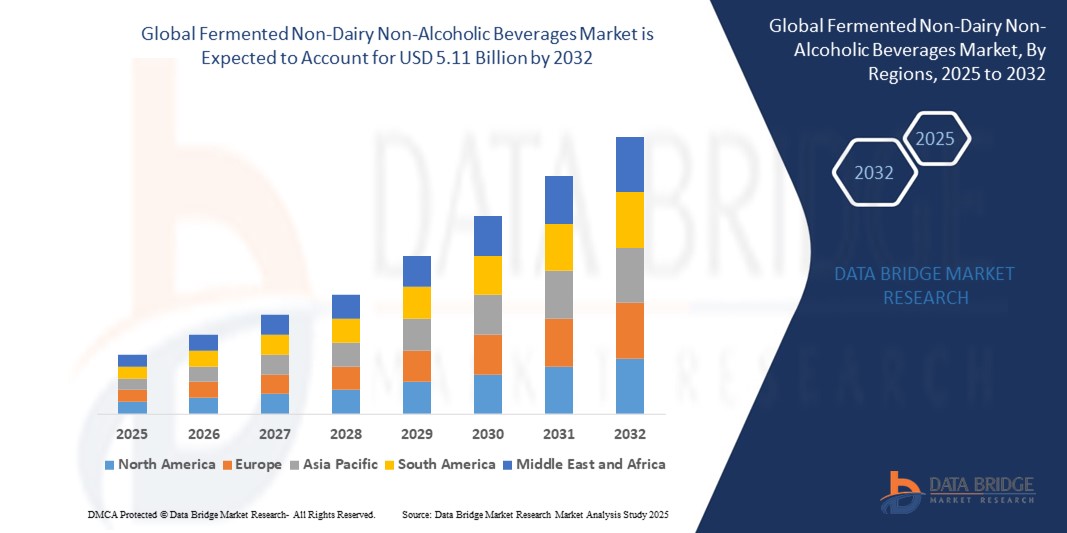Global Fermented Non Dairy Non Alcoholic Beverages Market
市场规模(十亿美元)
CAGR :
% 
 USD
3.73 Billion
USD
5.11 Billion
2024
2032
USD
3.73 Billion
USD
5.11 Billion
2024
2032
| 2025 –2032 | |
| USD 3.73 Billion | |
| USD 5.11 Billion | |
|
|
|
|
全球發酵非乳製品非酒精飲料市場,按來源(水果、蔬菜、穀物等)、類型(無乳製品、可飲用優格、發酵軟性飲料、發酵果汁和非乳製品克菲爾)和分銷管道(零售店、百貨公司、超市、大賣場、專賣店和電子商務)劃分——行業趨勢和預測到 2032 年。
發酵非乳製非酒精飲料市場規模
- 2024 年全球發酵非乳製品非酒精飲料市場規模為37.3 億美元 ,預計 到 2032 年將達到 51.1 億美元,預測期內 複合年增長率為 4.00%。
- 市場成長主要得益於消費者對植物性和健康飲料的偏好日益增長、發酵技術的進步以及人們對發酵非乳飲料的健康益處的認識不斷提高
- 此外,對含有益生菌的功能性飲料的需求不斷增長,以及人們向可持續和純素食生活方式的轉變,使發酵型非乳製非酒精飲料成為消費者的首選,從而顯著促進了行業增長
發酵型非乳製品非酒精飲料市場分析
- 發酵的非乳製品非酒精飲料,如康普茶、非乳製品克菲爾和發酵果汁,作為健康飲食的重要組成部分,越來越受歡迎,具有改善腸道健康、增強免疫力和不含乳製品或酒精的天然風味等益處
- 人們對這類飲料的需求不斷增長,這得益於人們健康意識的增強、素食主義和植物性飲食運動的興起,以及消費者對低糖、天然成分功能性飲料的偏好
- 亞太地區在發酵非乳製品非酒精飲料市場佔據主導地位,2024 年的收入份額最高,為 42.5%,這得益於人們對發酵食品的強烈文化親和力、快速的城市化以及可支配收入較高的中產階級人口的增長,尤其是在中國、日本和韓國等國家
- 由於越來越多人開始採用注重健康的飲食習慣、可支配收入不斷增加以及益生菌飲料的意識不斷增強,預計中東和非洲將成為預測期內增長最快的地區
- 2024 年,水果類產品佔據了最大的市場收入份額,達到 38.2%,這得益於蘋果、漿果和菠蘿等水果在康普茶和發酵果汁等飲料中的廣泛使用,這些飲料因其誘人的口味和健康益處而廣受歡迎
報告範圍和發酵非乳製品非酒精飲料市場細分
|
屬性 |
發酵型非乳製品非酒精飲料關鍵市場洞察 |
|
涵蓋的領域 |
|
|
覆蓋國家 |
北美洲
歐洲
亞太
中東和非洲
南美洲
|
|
主要市場參與者 |
|
|
市場機會 |
|
|
加值資料資訊集 |
除了市場價值、成長率、市場區隔、地理覆蓋範圍、市場參與者和市場情景等市場洞察之外,Data Bridge 市場研究團隊策劃的市場報告還包括深入的專家分析、進出口分析、定價分析、生產消費分析和 pestle 分析。 |
發酵型非乳製品非酒精飲料市場趨勢
“先進發酵技術與產品創新的融合日益加深”
- 全球發酵非乳製品非酒精飲料市場正經歷先進發酵技術與持續產品創新相結合的重要趨勢
- 這些技術能夠精確控制發酵過程,並增強康普茶、水克菲爾和發酵果汁等飲料的濃稠度、風味和營養價值
- 先進的發酵平台可以開發富含益生菌的飲料,滿足消費者對支持腸道健康和免疫力的功能性飲料日益增長的需求
- 例如,企業正在利用創新的發酵技術來創造新的風味組合,如植物性康普茶或低糖發酵檸檬水,以滿足不同消費者的喜好
- 這一趨勢增加了發酵型非乳製飲料的吸引力,使其對注重健康的消費者更具吸引力,並擴大了其在主流和小眾市場的覆蓋範圍
- 數據分析和消費者回饋被用於監控購買趨勢和偏好,使製造商能夠推出個人化產品並優化生產效率
發酵型非乳製非酒精飲料市場動態
司機
“植物基和功能性飲料的需求不斷增長”
- 受健康、道德和環境因素的驅動,消費者對植物性飲食和功能性飲料的偏好日益增長,這是全球發酵非乳製品非酒精飲料市場的主要驅動力
- 這些飲料包括不含乳製品的飲用優格、發酵軟性飲料和非乳製品克菲爾,具有改善消化、增強免疫力和豐富營養等健康益處,與素食主義和乳糖不耐症意識的提高相一致
- 監管支持和推廣植物性飲食的舉措,尤其是在亞太地區,透過鼓勵創新和採用,進一步加速了市場成長
- 電子商務平台的普及以及超市和專賣店等分銷管道的改善,讓消費者更容易獲得各種發酵型非乳製品飲料
- 製造商越來越多地提供創新產品,例如椰奶克菲爾和杏仁奶酸奶,作為標準或高端產品,以滿足不斷變化的消費者期望並提升產品價值
克制/挑戰
“高生產成本和監管合規問題”
- 先進的發酵設備、品質控制系統和原材料所需的大量初始投資可能是進入市場的主要障礙,特別是對於中東和非洲等新興市場的小規模生產商而言
- 開發和擴大發酵型非乳製品飲料(例如源自水果、蔬菜或穀物的飲料)的生產可能很複雜且耗費資源,從而導致產品成本更高
- 此外,不同地區的法規合規性和標準差異也帶來了重大挑戰。益生菌和功能性飲料的生產和標籤必須遵守嚴格的安全和品質法規,而這些法規在不同國家可能存在很大差異。
- 對微生物安全、健康聲明的準確標註以及食品安全標準的遵守情況的擔憂,給在國際上運營的製造商和分銷商帶來了運營複雜性
- 這些因素可能會限制市場擴張,特別是在監管框架嚴格或消費者成本敏感性是一個重要因素的地區
發酵非乳製品非酒精飲料市場範圍
市場根據來源、類型和分銷管道進行細分。
- 按來源
根據來源,全球發酵非乳製品非酒精飲料市場細分為水果、蔬菜、穀物和其他。 2024年,水果類飲料佔據了最大的市場收入份額,達到38.2%,這得益於蘋果、漿果和菠蘿等水果在康普茶和發酵果汁等飲料中的廣泛使用,這些飲料因其誘人的口味和健康益處而廣受歡迎。
預計穀物產業將在 2025 年至 2032 年間實現最快的成長率,這得益於消費者對格瓦斯和甘酒等穀物發酵飲料的需求不斷增長,尤其是在亞太和非洲等傳統穀物發酵方式盛行的地區。
- 按類型
根據類型,全球發酵非乳製品非酒精飲料市場細分為無乳飲用優格、發酵軟性飲料、發酵果汁和非乳製品克菲爾。發酵軟性飲料,尤其是康普茶,在2024年佔據了60%的最大市場收入份額,這得益於其富含益生菌和多樣化的風味,深受注重健康的消費者(尤其是千禧世代)的喜愛。
預計非乳製品克菲爾領域在 2025 年至 2032 年間將經歷 12.8% 的最快增長率,這得益於對椰奶克菲爾和杏仁奶克菲爾等植物性替代品的需求不斷增長,這些替代品迎合了尋求具有消化健康益處的功能性飲料的素食主義者和乳糖不耐症消費者的需求。
- 按分銷管道
根據分銷管道,全球發酵非乳製品非酒精飲料市場可細分為零售店、百貨公司、超市、大賣場、專賣店和電商。超市/大賣場佔據主導地位,2024年的收入份額為45.3%,這得益於其廣泛的覆蓋範圍、豐富的產品種類以及消費者在購買前進行實物檢查的偏好。
預計2025年至2032年,電子商務領域將實現13.5%的最快成長率,這得益於網路普及率的提高、網購的便利性以及小眾和特色產品的供應。新冠疫情進一步加速了向電子商務的轉變,提高了全球注重健康的消費者的可及性。
發酵非乳製品非酒精飲料市場區域分析
- 亞太地區在發酵非乳製品非酒精飲料市場佔據主導地位,2024 年的收入份額最高,為 42.5%,這得益於人們對發酵食品的強烈文化親和力、快速的城市化以及可支配收入較高的中產階級人口的增長,尤其是在中國、日本和韓國等國家
- 消費者優先考慮發酵飲料的健康益處,包括有益於消化健康的益生菌、免疫支持以及與純素和植物性飲食相符的成分,尤其是在健康意識不斷增強的地區
- 植物發酵和益生菌增強等發酵技術的進步,以及零售和電子商務分銷管道的日益普及,推動了成長
日本發酵型非乳製品非酒精飲料市場洞察
日本發酵型非乳製品非酒精飲料市場預計將迎來快速成長,原因是消費者強烈偏好高品質、富含益生菌、有益健康的飲料。大型食品飲料製造商的進駐,以及康普茶和非乳製品克菲爾等產品在零售和電商通路的整合,加速了市場滲透。人們對健康飲食日益增長的興趣也促進了市場成長。
中國發酵型非乳製品非酒精飲料市場洞察
中國佔據亞太地區發酵型非乳製品非酒精飲料市場的最大份額,這得益於快速的城鎮化、日益增強的健康意識以及對植物性飲料日益增長的需求。中國日益壯大的中產階級和對預防性醫療保健的重視,推動了康普茶、發酵果汁和非乳製品克菲爾等產品的普及。強大的國內製造能力和極具競爭力的價格提升了市場進入。
中東和非洲發酵型非乳製品非酒精飲料市場洞察
預計中東和非洲地區將見證發酵型非乳製品非酒精飲料市場最快的成長,這得益於消費者對健康益處的認識不斷提高以及植物性飲食的日益普及。由於對富含益生菌的飲料的需求不斷增長以及電商平台的不斷擴張,南非和阿聯酋等國家表現出顯著的成長勢頭。該地區對健康和保健的關注,加上可支配收入的不斷增長,將支撐市場擴張。
美國發酵非乳製品非酒精飲料市場洞察
美國發酵型非乳製品非酒精飲料市場預計將迎來顯著成長,這得益於消費者對健康飲品的強勁需求,以及益生菌益處日益提升的認知。純素食主義和植物性飲食的流行,加上蓬勃發展的健康養生文化,推動了市場擴張。康普茶、非乳製品克菲爾和發酵果汁等產品在超市和線上平台的供應,進一步推動了市場成長。
歐洲發酵型非乳製品非酒精飲料市場洞察
預計歐洲發酵型非乳製品非酒精飲料市場將迎來快速成長,這得益於消費者對健康、永續性和植物性飲食日益增長的關注。德國、法國和英國等國家對富含益生菌的飲料(例如康普茶和非乳製品克菲爾)的需求不斷增長,這些飲料有助於增強消化系統健康,並符合純素食者的偏好,因此其增長顯著。在產品創新的推動下,零售和電商通路的成長都十分顯著。
英國發酵非乳製品非酒精飲料市場洞察
英國發酵型非乳製品非酒精飲料市場預計將迎來快速成長,這得益於消費者對健康食品和植物性產品日益增長的興趣。康普茶和非乳製品克菲爾等飲料因其益生菌含量高且符合純素飲食的概念,其需求正在增長。消費者對功能性飲料偏好的不斷變化以及電商平台的擴張,進一步推動了這類飲料的普及。
德國發酵型非乳製品非酒精飲料市場洞察
由於德國先進的食品飲料產業以及消費者對健康保健的高度關注,預計德國發酵型非乳製品非酒精飲料市場將迎來快速成長。德國消費者更青睞具有功能性益處的飲料,例如康普茶和發酵果汁,它們有助於促進消化系統健康和永續發展。這些產品在超市、專賣店和線上零售通路的整合,將協助市場持續成長。
發酵型非乳製非酒精飲料市佔率
發酵型非乳製品非酒精飲料產業主要由知名公司主導,其中包括:
- Good Karma Foods(美國)
- Health-Ade LLC(美國)
- Konings(比利時)
- 芬蒂曼斯(英國)
- Lifeway Foods, Inc.(美國)
- GT's Living Foods(美國)
- Chr. Hansen Holding A/S(丹麥)
- Probi(瑞典)
- ORIKA(韓國)
- 杜邦(美國)
- 養樂多本社株式會社(日本)
- 通用磨坊公司(美國)
- AGM Foods Pty. Ltd.(澳洲)
全球發酵非乳製品非酒精飲料市場的最新發展如何?
- 2024年11月,Bliss Body推出了印度首款小米發酵功能性飲料,包括鳳梨、芒果和柳橙口味,在印度健康飲料市場掀起波瀾。這些無糖飲料旨在促進腸道健康、幫助糖尿病管理並提升整體健康水平。 Bliss Body利用發酵小米等古老食材的營養價值,重新定義功能性營養,並專注於自然健康和永續性。此次新品發表反映出印度飲料產業消費者日益轉向清潔標籤、注重健康的創新產品。
- 2024年8月,養樂多本社株式會社推出了養樂多桃子風味,為其發酵乳飲料系列增添了活力。這款新品富含多汁的桃子風味,蘊含數十億個乾酪乳桿菌代田菌,經過科學驗證,有益於腸道健康。它富含維生素C,無脂肪、無麩質,適合素食者,且比原始配方的卡路里和糖分更低。養樂多桃子口味採用可回收紙板包裝,8 x 65毫升瓶裝,體現了品牌對口味創新和功能性健康的追求,吸引了注重健康的消費者,他們正在尋找美味、非乳製的益生菌選擇。
- 2021年8月,First Bev收購了Health-Ade的控股權。 Health-Ade是一個頂級康普茶品牌,以其腸道健康益處和豐富的產品線而聞名。此次收購得到了專注於營養的投資公司Manna Tree的支持,標誌著First Bev的策略轉型,旨在深化其在功能性飲料市場的影響力。 Health-Ade的創辦人轉任新的領導職位,經驗豐富的飲料高管Jack Belsito被任命為首席執行官,引領品牌的下一個成長階段。此次收購旨在擴大Health-Ade的影響力,促進創新,並利用消費者對消化健康和發酵飲料日益增長的興趣。
- 2021年7月,澳洲領先的發酵飲料品牌Remedy在美國首次亮相,推出了一系列活力四射的活性無糖康普茶飲品。為了滿足消費者對健康植物性發酵飲料日益增長的需求,Remedy推出了薑汁檸檬、桃子、混合漿果和覆盆子檸檬水等口味。 Remedy的康普茶採用傳統的30天發酵工藝,以強效活性菌(SCOBY)釀造,富含有機酸、抗氧化劑和活性菌種,且不添加糖。此次發布標誌著Remedy戰略性地進軍全球最大的康普茶市場,進一步鞏固了其對口味、健康和創新的承諾。
- 2021年5月,Good Karma Foods推出了創新的Plantmilk系列——由燕麥、亞麻和豌豆混合製成的冷藏植物奶。這款牛奶有原味、香草和巧克力口味可供選擇,擁有2%牛奶的濃鬱口感,蛋白質含量是杏仁奶的五倍,每份含有800毫克的Omega-3脂肪酸。此次新品發布還包含一個直銷電商平台,擴大了消費者的可及性,並滿足了消費者對可持續、營養豐富的非乳製品日益增長的需求。此舉標誌著品牌開啟了新的篇章,強調口味、營養和環境責任。
SKU-
Get online access to the report on the World's First Market Intelligence Cloud
- Interactive Data Analysis Dashboard
- Company Analysis Dashboard for high growth potential opportunities
- Research Analyst Access for customization & queries
- Competitor Analysis with Interactive dashboard
- Latest News, Updates & Trend analysis
- Harness the Power of Benchmark Analysis for Comprehensive Competitor Tracking
研究方法
数据收集和基准年分析是使用具有大样本量的数据收集模块完成的。该阶段包括通过各种来源和策略获取市场信息或相关数据。它包括提前检查和规划从过去获得的所有数据。它同样包括检查不同信息源中出现的信息不一致。使用市场统计和连贯模型分析和估计市场数据。此外,市场份额分析和关键趋势分析是市场报告中的主要成功因素。要了解更多信息,请请求分析师致电或下拉您的询问。
DBMR 研究团队使用的关键研究方法是数据三角测量,其中包括数据挖掘、数据变量对市场影响的分析和主要(行业专家)验证。数据模型包括供应商定位网格、市场时间线分析、市场概览和指南、公司定位网格、专利分析、定价分析、公司市场份额分析、测量标准、全球与区域和供应商份额分析。要了解有关研究方法的更多信息,请向我们的行业专家咨询。
可定制
Data Bridge Market Research 是高级形成性研究领域的领导者。我们为向现有和新客户提供符合其目标的数据和分析而感到自豪。报告可定制,包括目标品牌的价格趋势分析、了解其他国家的市场(索取国家列表)、临床试验结果数据、文献综述、翻新市场和产品基础分析。目标竞争对手的市场分析可以从基于技术的分析到市场组合策略进行分析。我们可以按照您所需的格式和数据样式添加您需要的任意数量的竞争对手数据。我们的分析师团队还可以为您提供原始 Excel 文件数据透视表(事实手册)中的数据,或者可以帮助您根据报告中的数据集创建演示文稿。














